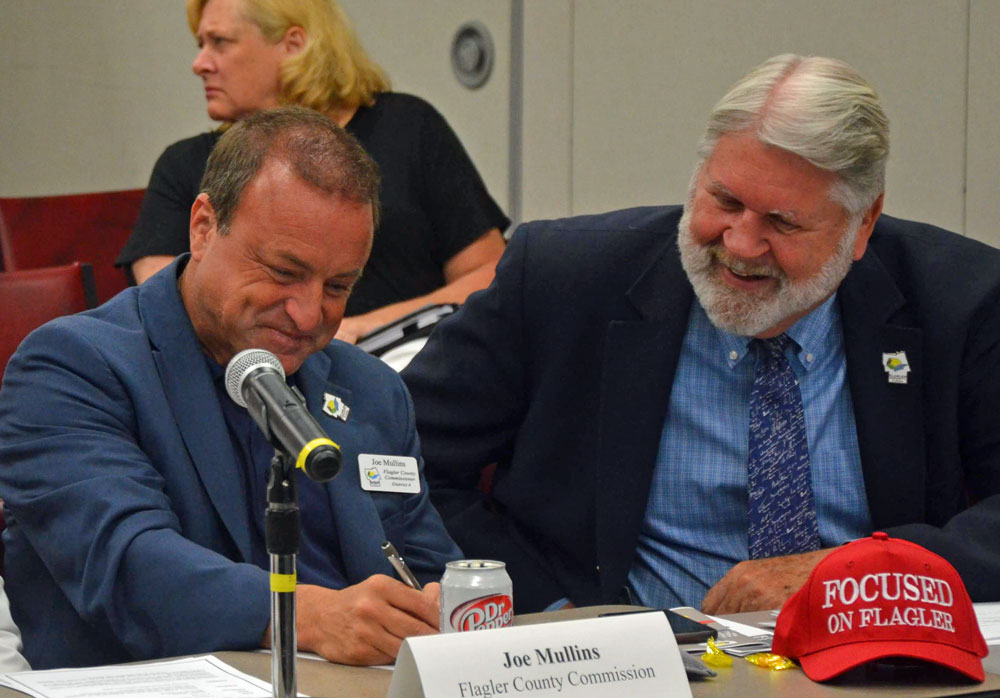Thanks again to Rep. Michael Waltz, his staff, VA Undersecretary and VA General Counsel for allowing flags to be placed on graves in St. Augustine this Memorial Day by St. Johns County Veterans Council.
We are all looking forward to VA adopting COVID-19 safety procedure in time for Veterans Day, and I have asked its cemetery advisory committee to help us.
Went to Sonny's BBQ afterwards with the bugler, retired St. Johns County Sheriff's Commander John Donlon, and retired deputy and U.S. Army Colonel Mark A. Tolzmann. Commander Donlon and I are probably related. My earliest ancestor fled Ireland in 1849 at age 6 as an orphan, fleeing British oppression -- her entire family died in the potato famine, and she came over to the U.S. My mother's maiden name was Donlon.
The rain stopped just in time for the abbreviated service. There was time for taps, a wreath and a prayer. We hope Veterans' Day brings back the traditional service at St. Augustine National Cemetery, our nation's oldest national cemetery.
Photo credit:
Col. Mark A. Tolzmann, U.S. Army (Ret.):
Taken Thursday, May 21, 2020 at 1545.
From
St. Augustine Record:
Small Memorial Day ceremony held in St. Augustine amid coronavirus
Previous
HIDE CAPTION
Pilots from a Green Cove Springs group fly over St. Augustine National Cemetery on Memorial Day, Monday, May 25, 2020. [SHELDON GARDNER/THE RECORD]
HIDE CAPTION
Ernest Johnson, an Air Force veteran from St. Johns County, tosses a gardenia blossom onto a grave at St. Augustine National Cemetery on Memorial Day, Monday, May 25, 2020. [SHELDON GARDNER/THE RECORD]
HIDE CAPTION
Six gardenias rest next to two headstones that mark the graves of “six unknown Indians” at St. Augustine National Cemetery on Memorial Day, Monday, May 25, 2020. [SHELDON GARDNER/THE RECORD]
HIDE CAPTION
John Donlon, a retired commander at the St. Johns County Sheriff’s Office who works part time for the agency, plays taps as local officials — Bill Dudley, chair of the Veterans Council of St. Johns County; Stephen Farris, a representative of Jacksonville National Cemetery; and retired Army Lt. Col. Ron Birchall — salute an American flag at St. Augustine National Cemetery on Memoria Day, Monday, May 25, 2020. [SHELDON GARDNER/THE RECORD]
HIDE CAPTION
Pilots from a Green Cove Springs group fly over St. Augustine National Cemetery on Memorial Day, Monday, May 25, 2020. [SHELDON GARDNER/THE RECORD]
HIDE CAPTION
Ernest Johnson, an Air Force veteran from St. Johns County, tosses a gardenia blossom onto a grave at St. Augustine National Cemetery on Memorial Day, Monday, May 25, 2020. [SHELDON GARDNER/THE RECORD]
HIDE CAPTION
Six gardenias rest next to two headstones that mark the graves of “six unknown Indians” at St. Augustine National Cemetery on Memorial Day, Monday, May 25, 2020. [SHELDON GARDNER/THE RECORD]
HIDE CAPTION
John Donlon, a retired commander at the St. Johns County Sheriff’s Office who works part time for the agency, plays taps as local officials — Bill Dudley, chair of the Veterans Council of St. Johns County; Stephen Farris, a representative of Jacksonville National Cemetery; and retired Army Lt. Col. Ron Birchall — salute an American flag at St. Augustine National Cemetery on Memoria Day, Monday, May 25, 2020. [SHELDON GARDNER/THE RECORD]
HIDE CAPTION
Pilots from a Green Cove Springs group fly over St. Augustine National Cemetery on Memorial Day, Monday, May 25, 2020. [SHELDON GARDNER/THE RECORD]
Next
By Sheldon Gardner
Posted May 25, 2020 at 5:22 PM
Updated May 25, 2020 at 5:47 PM
The normal Memorial Day crowds weren’t there because of the coronavirus. Plus skies were gray and rain drizzled all around.
Yet people still came to St. Augustine National Cemetery on Monday afternoon to honor those who have died while serving in the U.S. military.
Normally, the Veterans Council of St. Johns County and officials with the Military Officers Association of America put together an event that draws large crowds.
But because of COVID-19 concerns, officials canceled the public ceremony and decided to hold a brief private ceremony instead, featuring the playing of taps.
“Obviously we can’t do the full-blown ceremonies as we’ve done in years past, but at the national cemeteries all over the country, we’re still honoring and remembering our fallen comrades,” said Bill Dudley, chair of the Veterans Council of St. Johns County.
Officials had also planned to have a flyover at the cemetery featuring several pilots from a Green Cove Springs group, but as the ceremony began officials believed it had been canceled because of the weather.
The cemetery was open Monday, so some people still came in, looked at headstones and observed the ceremony. Around 30 people were at the site. Some walked solemnly through the cemetery, pausing to look at graves.
Among them was Ernest Johnson, an Air Force veteran and St. Johns County resident.
Veterans connected to St. Johns County who have died since Memorial Day 2019
ARMY
Carl Anderson, WWII
Charles S. Anderson, Iraq
Douglas Anderson, Korea
Lester N. Boggs, WWII
Command Sgt. Maj. Charles A. Boulden, retired, Vietnam
Randall A. Boyer
John Bozzone
Charles E. Burke
Scott C. Cameron
Anthony Colasuono
Gregory Collard
Wayne R. Colvin
Paul Cribb, Ret., WWII
John S. Dornblaser
Angelo J. Dumont, Korea
Darell Dunn
James E.R. Ferguson, retired, Vietnam
Frantz Fraiken, Belgian Army
Maj. Stephen F. Greene, retired, Desert Storm
Harry E. Griffith
George Hahn
Jesse Hart, WWII
Rued Hartmann, Swiss Army
Bernie G. Jackson, Korea
Charles Klevence, WWII
Robert Knapik
Ronald Kowalczyk
Ronnie L. Lester, Vietnam
Master Sgt. Edmund N. Lundell, retired
Daniel W. MacDonald
John Mancuso
Coy McDonald, retired, Vietnam
William H. McNeil, retired
Clifford Mills, Korea
Howard W. Mizell
Paul F. Moore, Vietnam
James E, Moran, WWII
John Mullaney
John R. Nauright
Sydney P. O’Connor
Jack Oliver, WWII
Charles Ostholm
Raymond A. Otis, Vietnam
Richard Owens
Allen Pacetti
Pinham E. Pacetti
George L. Paidas, WWII, Greek Army
Charles E. Parkes
Curtis A. Peele, Korea
Nelson, R. Pottinger, Vietnam, Purple Heart
Paul Putnam, Korea
Walter Rember, WWII
Stephanie A. Robinson
Eva Shelley, WWII
Sgt. Maj. Larry L. Shook, Vietnam, Purple Heart, Bronze Star Medal
Douglas Shull
Chester Smilgelski
Charles U. Smith
Albert Staknaker
Bernars Steinhauser, WWII, Purple Heart
Lonnie E. Stout
Lt. Col. Earl “Hap” Thompson, retired, Vietnam
Master Sgt. Roland L. Thompson, retired, Vietnam
Earl Vaughn
Chief Warrant Officer 4 Eliser Sarah Vigil
Marion Waller, Korea
Jack Weedman
Orion P. Wells, Korea
James Winne, Korea
Peter Withers
Donald Woolley
Frederick A. Yonkman, Korea
MARINE CORPS
Paul F. Beccue
Allen N. Berry
Edward F. Blaha
Ronald R. Braddock
Ocee G. Brown
John W. Cozart, Desert Storm
Vernon A. Davis
Ronnie E. Gamble
Patrick L. Hardee
Arthur S. Heffner, WWII
Jene F. Hendershott
Robert James, WWII
Regis J. Nalepka
Francis Oberman
Elmer W. Russell, WWII
Carl W. Stewart, Vietnam
George Van Hartogh
J.P. Walls
Charles E. Weaver, Korea
NAVY
Chief Petty Officer Joel G. Adams, retired
Arturo Arenas, Korea
David L. Arnold
Michael J. Asselta
William O. Balanzategui
Rudy Boesch, Vietnam
Lauren Bruner, WWII, Pearl Harbor
Roland W. Bussiere
Andrew J, Cammarerie
William D. Carlson, Korea
Daniel Chitwood
Harold Bull Clark, retired, Vietnam
George E. Clulow
Chief Petty Officer John M. Collins
Clarence J. Dieter, Vietnam
James J. Dupont
Kenneth Farrow, Korea
Edward Feightner, retired, WWII
Richard Gatchell
Cmdr. Jack J. Greenberg
Robert M. Hall, Korea
William R. Halliman
Gene Harms, WWII
Don Howison, WWII, USS Indianapolis
Richard E. Irvin, WWII
Wilmer L. Jackson
Edward LaMontagne
Newman “Whitey” Landis, WWII
John G. Lane, WWII
Nicholas Latgis, WWII
Willard Lewis, WWII
James Lumm, Korea
Eugene Lyon, Korea
James J. McAdams, Korea
Robert W. McEnrue
Billy H. McGoogan
Martin E. Miller
Robert Pamer
Frederic Pius, Korea
Jack Michael Shirkey
Henry W. Smith
Kenneth T. Mullen, WWII
Arebert Rosen
John Russell
Robert L. Schlievert
Clinton B. Schoch
Peggy Sue Sewell
Elizabeth T. Smith
Henry W. Smith
William L. Squire
Donald Stratton, WWII, Pearl Harbor
Mary Ellen Syrup
Joseph W. Vaughn, WWII
Herbert “Herbie” Wiles
Eugene Zarroli
AIR FORCE
Carl Alexanderson, WWII
Ronald Bergeron, Korea
Col. Richard Darenberg, retired
Tom C. Debow
Maj. Gen. John Dolny, retired, WWII
Donald B. Durett
Frank P. Giannola
Edward J. Hencinski, Korea
Barbara Kalman
Lt. Col. Arthur J. Hamilton, WWII, D-Day
Chief Master Sgt. Joseph Iscowitz, retired, WWII, Pearl Harbor, Korea
John F. Kirkwood, Korea
Francis J. Kryzwik
Ellis A. Lockwood, Royal Air Force
Philip Moan
Robert Nord
Dorothy Olsen, WASP, WWII
Donald Ousley
Harold Pabst
Michael J. Painter
William A. Pickard
Lt. Gen. Ed Tenoso, retired, Silver Star Medal
Barry J. Tuttle
Lt. Col. Joan L. Vanscoy, retired
David Brian Wallace
Richard E. Waler, Korea
Carleton Wing
Weldon Woody Woodall
U.S. COAST GUARD
Margaret J. Foster
Michael E. Marcon
Edward Melzer
Jerry Pomar
John Rassa
Craig A. Townsend
Barry J. Tuttle
MERCHANT MARINE
Henry W. Smith
Rufus Bubba Stratton













